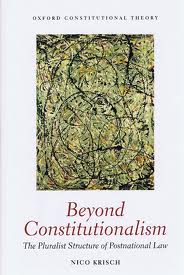
| Judul | Beyond Constitutionalism : The Pluralist Structure of Postnational Law / Nico Krisch |
| Pengarang | Krisch, Nico |
| Penerbitan | Oxford ; New York : Oxford University Press, 2011 |
| Deskripsi Fisik | xxiv, 358 p. ; 24 cm. ;24 cm. |
| ISBN | 978-0199228317 |
| Subjek | Constitutional law Legal polycentricity International law |
| Abstrak | Under pressure from globalization, the classical distinction between domestic and international law has become increasingly blurred, spurring demand for new paradigms to construe the emerging postnational legal order. The typical response of constitutional and international lawyers as well as political theorists has been to extend domestic concepts - especially constitutionalism - beyond the state. Yet as this book argues, proposals for postnational constitutionalism not only fail to provide a plausible account of the changing shape of postnational law but also fall short as a normative vision. They either dilute constitutionalism's origins and appeal to 'fit' the postnational space; or they create tensions with the radical diversity of postnational society. This book explores an alternative, pluralist vision of postnational law. Pluralism does not rely on an overarching legal framework but is characterized by the heterarchical interaction of various suborders of different levels - an interaction that is governed by a multiplicity of conflict rules whose mutual relationship remains legally open. A pluralist model can account for the fragmented structure of the European and global legal orders and it reflects the competing (and often equally legitimate) claims for control of postnational politics. However, it typically provokes concerns about stability, power and the rule of law. This book analyzes the promise and problems of pluralism through a theoretical enquiry and empirical research on major global governance regimes, including the European human rights regime, the contestation around UN sanctions and human rights, and the structure of global risk regulation. The empirical research reveals how prevalent pluralist structures are in postnational law and what advantages they possess over constitutionalist models. Despite the problems it also reveals, the analysis suggests cautious optimism about the possibility of stable and fair cooperation in pluralist settings. |
| Bahasa | Inggris |
| Bentuk Karya | Tidak ada kode yang sesuai |
| Target Pembaca | Tidak ada kode yang sesuai |
| Tag | Ind1 | Ind2 | Isi |
| 001 | INLIS000000000009229 | ||
| 005 | 20221101021700 | ||
| 008 | 221101################|##########|#eng## | ||
| 020 | # | # | $a 978-0199228317 |
| 035 | # | # | $a 0010-0520009229 |
| 041 | $a eng | ||
| 082 | # | # | $a 342 |
| 084 | # | # | $a 342 KRI b |
| 100 | 0 | # | $a Krisch, Nico |
| 245 | 1 | # | $a Beyond Constitutionalism : The Pluralist Structure of Postnational Law /$c Nico Krisch |
| 260 | # | # | $a Oxford ; New York :$b Oxford University Press,$c 2011 |
| 300 | # | # | $a xxiv, 358 p. ; 24 cm. ; $c 24 cm. |
| 520 | # | # | $a Under pressure from globalization, the classical distinction between domestic and international law has become increasingly blurred, spurring demand for new paradigms to construe the emerging postnational legal order. The typical response of constitutional and international lawyers as well as political theorists has been to extend domestic concepts - especially constitutionalism - beyond the state. Yet as this book argues, proposals for postnational constitutionalism not only fail to provide a plausible account of the changing shape of postnational law but also fall short as a normative vision. They either dilute constitutionalism's origins and appeal to 'fit' the postnational space; or they create tensions with the radical diversity of postnational society. This book explores an alternative, pluralist vision of postnational law. Pluralism does not rely on an overarching legal framework but is characterized by the heterarchical interaction of various suborders of different levels - an interaction that is governed by a multiplicity of conflict rules whose mutual relationship remains legally open. A pluralist model can account for the fragmented structure of the European and global legal orders and it reflects the competing (and often equally legitimate) claims for control of postnational politics. However, it typically provokes concerns about stability, power and the rule of law. This book analyzes the promise and problems of pluralism through a theoretical enquiry and empirical research on major global governance regimes, including the European human rights regime, the contestation around UN sanctions and human rights, and the structure of global risk regulation. The empirical research reveals how prevalent pluralist structures are in postnational law and what advantages they possess over constitutionalist models. Despite the problems it also reveals, the analysis suggests cautious optimism about the possibility of stable and fair cooperation in pluralist settings. |
| 650 | 4 | $a Constitutional law | |
| 650 | 4 | $a International law | |
| 650 | 4 | $a Legal polycentricity | |
| 990 | # | # | $a 22299/MKRI-P/XI-2011 |
| 990 | # | # | $a 22299/MKRI-P/XI-2011 |
| 990 | # | # | $a 22299/MKRI-P/XI-2011 |
| 990 | # | # | $a 22300/MKRI-P/XI-2011 |
| 990 | # | # | $a 22300/MKRI-P/XI-2011 |
| 990 | # | # | $a 22300/MKRI-P/XI-2011 |
Content Unduh katalog
Karya Terkait :